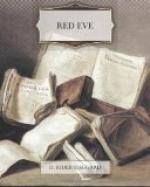My son, I have no good news for you. The Pope at Avignon, having studied the matter, (if indeed it ever reached his own ears) writes by one of his secretaries to say that he will not dissolve the alleged marriage between the Count of Noyon and the lady Eve of Clavering until the parties have appeared before him and set out their cause to his face. Therefore Eve cannot come to you, nor must you come to her while de Noyon lives, unless the mind of his Holiness can be changed. Should France become more quiet, so that English folk can travel there in safety, perchance Eve and I will journey to Avignon to lay her plaint before the Holy Father. But as yet this seems scarcely possible. Moreover, I trust that the traitor, Acour, may meet his end in this way or in that, and so save us the necessity. For, as you know, such cases take long to try, and the cost of them is great. Moreover, at the Court of Avignon the cause of one of our country must indeed be good just now when the other party to it is of the blood of France.
Soon I hope to write to you again, who at present have no more to say, save that notwithstanding my years I am well and strong, and would that I sat with you before the walls of Calais. God’s blessing and mine be on you, and to Richard the archer, greetings. Dunwich has heard how he shot the foul-tongued Frenchman before the great battle closed, and the townsfolk lit a bonfire on the walls and feasted all the archers in his honour.
Andrew Arnold.
“I have found another letter,” said Master de Cressi, when Hugh had finished reading, “which I remember Sir Andrew charged me to give to you also,” and he handed him a paper addressed in a large, childish hand.
Hugh broke its silk eagerly, for he knew that writing.
“Hugh,” it began simply, “Clement the Pope will not void my false marriage unless I appear before him, and this as yet I cannot do because of the French wars. Moreover, he sets the curse of the Church upon me and any man with whom I shall dare to re-marry until this be done. For myself I would defy the Church, but not for you or for children that might come to us. Moreover, the holy father, Sir Andrew, forbids it, saying that God will right all in His season and that we must not make Him wroth. Therefore, Hugh, lover you are, but husband you may not be while de Noyon lives or until the Pope gives his dispensation of divorce, which latter may be long in winning, for the knave de Noyon has been whispering in his ear. Hugh, this is my counsel: Get you to the King again and crave his leave to follow de Noyon, for if once you twain can come face to face I know well how the fray will end. Then, when he is dead, return to one who waits for you through this world and the next.
“Hugh, I am proud of your great deeds. No longer can they mock you as ‘the merchant’s son,’ Sir Hugh. God be with you, as are my prayers and love.
“Eve Clavering.”




